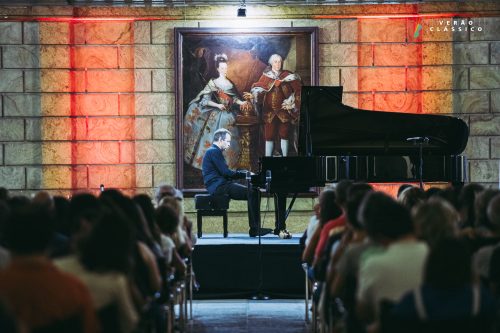the tenth Verão Clássico Competition kicks off – Seen and Heard Worldwide
 Portugal Verão Clássico Competition 2024 – MasterFest Live performance I: Stephan Picard, Eszter Haffner (violins); Miguel da Silva, Eszter Haffner (violas); Patrick Demenga (cello); Janne Saksala (double bass); Geir Draugsvoll (accordion); Eldar Nebolsin, Filipe Pinto-Ribeiro (piano). Museu Nacional dos Coches, Lisbon, 23.7.2024. (LV) [This performance was reviewed from a video provided by Verão Clássico]
Portugal Verão Clássico Competition 2024 – MasterFest Live performance I: Stephan Picard, Eszter Haffner (violins); Miguel da Silva, Eszter Haffner (violas); Patrick Demenga (cello); Janne Saksala (double bass); Geir Draugsvoll (accordion); Eldar Nebolsin, Filipe Pinto-Ribeiro (piano). Museu Nacional dos Coches, Lisbon, 23.7.2024. (LV) [This performance was reviewed from a video provided by Verão Clássico]

Dvořák – Bagatelles, Op.47
Robert Schumann – Fantasiestücke, Op.12
Mendelssohn – Piano Sextet, Op.110
For the primary of 4 concert events by school members of the tenth Verão Clássico Competition, creative director Filipe Pinto-Ribeiro programed one in all Robert Schumann’s most private journeys of the center and surrounded it with an endearing curiosity by Dvořák and one in all Mendelssohn’s youthful miracles.
It was Eldar Nebolsin who stole the present with a efficiency of Schumann’s Fantasiestücke Op.12 that made the simplicity of character and feeling inform. He established the temper with an inner purity in ‘Des Abends’ and navigated the emotional hills and valleys of ‘Aufschwung’ with out letting the notes obscure the feelings. After a quietly rapt ‘Warum’, the Uzbek-born virtuoso discovered unusually affectionate humor in ‘Grillen’ and plunged headlong into the extraordinary amorous adventures of ‘In der Nacht’. He flashed out majestically in ‘Traumes Wirren’ earlier than ending with an ‘Ende vom Lied’ that was deeply consoling and, within the composer’s idiosyncratically ambiguous manner, joyful and even triumphant. Certainly, Nebolsin himself appeared more and more beneath the music’s spell, and when he completed and had seemingly left nothing on the keyboard, the viewers showered him with the heat of their applause.
The live performance began with Dvořák’s 5 Bagatelles which had been initially supposed for house efficiency by 4 fairly achieved string-playing amateurs and one taking part in the harmonium, a nineteenth-century keyboard relic. Regardless of its modest origins, the piece incorporates most of the mature composer’s most beloved touches which has endeared it to file collectors, regardless that alternatives to listen to it reside are uncommon.
One downside is finding a harmonium and, missing that, discovering an satisfactory substitute. The perfect substitute would simulate the harmonium’s organ-like wheezing that Dvořák drew on for the primary and third actions with their reference to bagpipes within the Czech folksong ‘Hrály dudy’. It seems that the accordion was an ideal substitute. and one can think about Dvořák’s delight if he had been in a position to hear the efficiency by Norwegian virtuoso Geir Draugsvoll who confirmed a nice steadiness between offering a discreet background and taking part in the occasional little solo riffs.

Mendelssohn’s Sextet Op.110, scored unusually for violins, two violas, cello, double bass and piano, is an untroubled and pleasant work. And but it was remodeled by Pinto-Ribeiro’s uncommon talents: he led with virtuosity and a youthful surge of poetry in each phrase, and nonetheless immersed himself within the total sound. Whereas the advanced tawny sound of violists Miguel da Silva and Eszter Haffner, together with the deep heat of Janne Saksala’s double bass, contributed to a full-bodied efficiency, they couldn’t disguise the truth that the Sextet is extra akin to a miniature piano concerto than conventional chamber music.
Along with the sheer pleasure of the music making, string-playing college students of the Verão Clássico Academia should have gained a lot from watching their lecturers in motion within the music by Dvořák and Mendelssohn: how they selected their bowings and fingerings and put collectively such affectionate performances wealthy in timbre, dynamics and articulation with solely a rehearsal or two.
This opening live performance of the Verão Clássico Competition showcased not solely the distinctive abilities of its school but additionally the wealthy variety of the classical repertoire, promising an thrilling sequence forward.
Laurence Vittes
